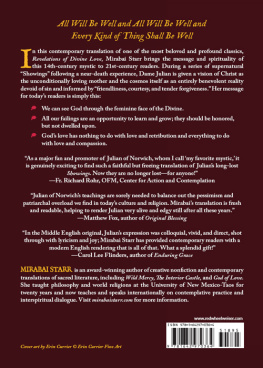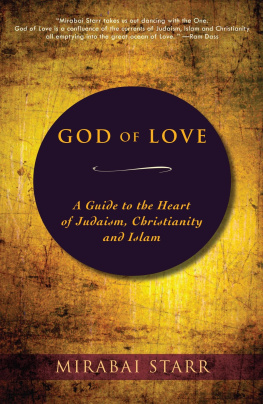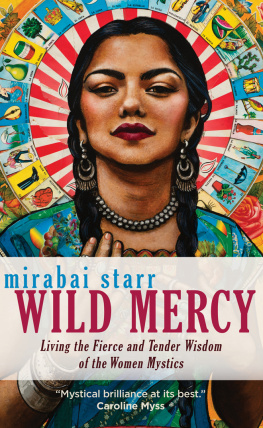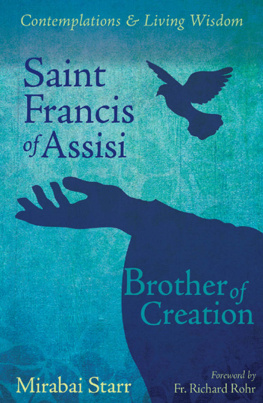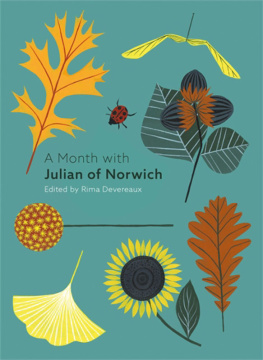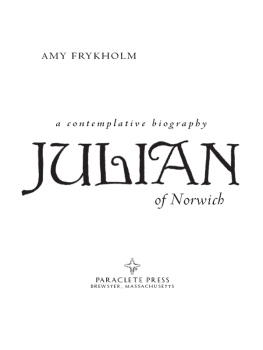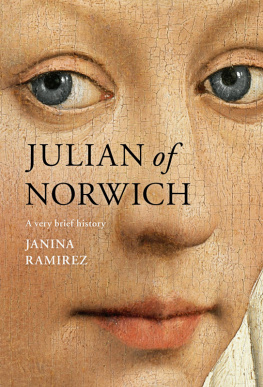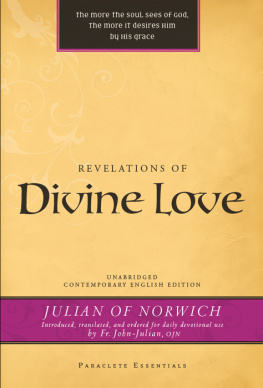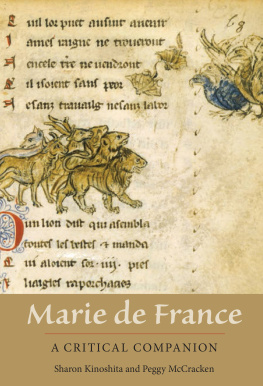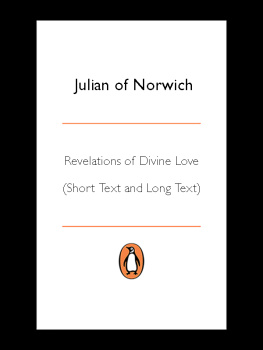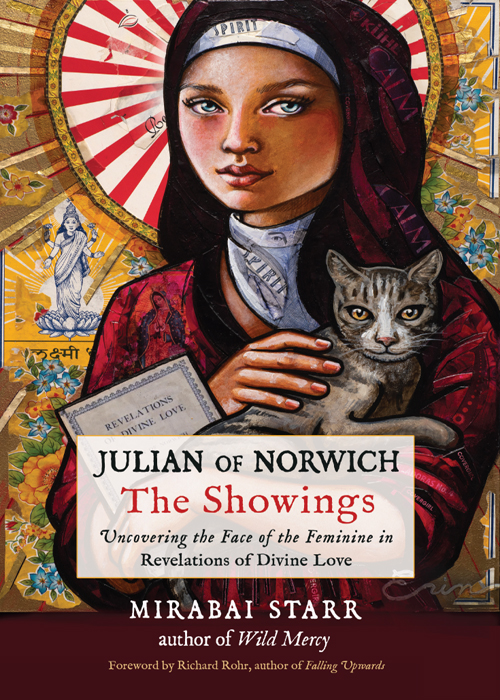
Praise for Julian of Norwich: The Showings
As a major fan and promoter of Julian of Norwich, whom I call my favorite mystic, it is genuinely exciting to find such a faithful but freeing translation of Julian's long lost Showings. Now they are no longer lostfor anyone!
FR. RICHARD ROHR, O.F.M.,
CENTER FOR ACTION AND CONTEMPLATION
Julian of Norwich deserves as wide a readership as possible today for her wise, deep, and spirited telling of the Christ story along with the Motherhood of God. Her teachings are sorely needed to balance out the pessimism and patriarchal overload we find in today's culture and religion. Mirabai's translation is fresh and readable, helping to render Julian very alive and edgy still after all these years. We should all be thankful for this gift from Julian and Mirabai.
MATTHEW FOX, AUTHOR OF ORIGINAL BLESSING,
A SPIRITUALITY NAMED COMPASSION, AND
HILDEGARD OF BINGEN, A SAINT FOR OUR TIMES:
UNLEASHING HER POWER IN THE 21ST CENTURY
Julian of Norwich's Showings shines with luminous mystical wisdomand Mirabai Starr's lovely and engaging translation of this medieval masterpiece makes it more accessible than ever.
CARL MCCOLMAN, AUTHOR OF THE BIG BOOK OF CHRISTIAN
MYSTICISM AND ANSWERING THE CONTEMPLATIVE CALL
In the Middle English original, Julian's expression was colloquial, vivid, and direct, shot through with lyricism and joy; Mirabai Starr has provided contemporary readers with a modern English rendering that is all of that. What a splendid gift!
CAROL LEE FLINDERS, AUTHOR OF ENDURING LIVES:
PORTRAITS OF WOMEN AND FAITH IN ACTION
Mirabai Starr offers Julian to a new audiencethe 21st-century spiritual seekerwhile respecting her medieval Christian context. It has long been my wish that all people may come to know this universal wisdom. Starr gives me hope that spiritual truths can break through religious borders.
PROF. FREDERICK RODEN, PHD, UNIVERSITY OF
CONNECTICUT, AUTHOR OF LOVE'S TRINITY:
A COMPANION TO JULIAN OF NORWICH

Copyright 2013, 2022 by Mirabai Starr
Foreword copyright 2022 by Richard Rohr
All rights reserved. No part of this publication may be reproduced or transmitted in any form or by any means, electronic or mechanical, including photocopying, recording, or by any information storage and retrieval system, without permission in writing from Red Wheel/Weiser, LLC. Reviewers may quote brief passages. Previously published in 2013 as The Showings of Julian of Norwich by Hampton Roads Publishing, ISBN 978-1-57174-691-7.
Cover design by Kathryn Sky-Peck
Cover art by Erin Currier Erin Currier Fine Art
Interior by Jane Hagaman
Hampton Roads Publishing Company, Inc.
Charlottesville, VA 22906
Distributed by Red Wheel/Weiser, LLC
www.redwheelweiser.com
Sign up for our newsletter and special offers by going to
www.redwheelweiser.com/newsletter.
ISBN 978-1-64297-036-4
Library of Congress Cataloging-in-Publication Data
Printed in the United States of America
IBI
10 9 8 7 6 5 4 3 2 1
To Fr. Bill, who so deeply knows God as Mother
I saw three ways to look at the Motherhood of God. The first is that she created our human nature. The second is that she took our human nature upon herself, which is where the motherhood of grace begins. And the third is motherhood in action, in which she spreads herself throughout all that is, penetrating everything with grace, extending to the fullest length and breadth, height and depth. All One Love.
JULIAN OF NORWICH
Contents
Foreword
This beautiful word mother is so sweet and kind in itself that it cannot be attributed to anyone but God.
Julian of Norwich
In this citation from Julian of Norwich: The Showings, Lady Julian offers us an amazing and foundational statement. She is not saying that the most beloved attributes of motherhood can analogously be applied to God, although I am sure she would agree they could. She is saying much morethat the very word mother is so definitive and beautiful in most peoples' experience (not everybody's, I must add) that it evokes, at its best, what we mean by Godwhich is sweetness and kindness. Except for their mystics, this is not what most of the world's religions have taught or believed up to now. Among these, Julian of Norwich stands as pivotal.
The concept and human experience of mother is so primal, so big, deep, universal, and wide that to apply it only to our own mothers is way too small a container. It can only be applied to God. Do any of us realize how revolutionary this is? Mother is, for Julian, the best descriptor for God Herself! I use this to illustrate the courageous, original, and yet fully orthodox character of Julian's teachingespecially in the hands of a likeminded translator like Mirabai Starr.
Julian helps me finally understand one major aspect of my own Catholic culture: why in heaven's name, for 1,500 years, did both the Eastern and Western churches attribute almost everything beautiful and beloved, every shrine, hill, cathedral, protection, blessing, statue, and most classic art in the Middle East and Europe, not usually to Jesus, or even to God, but to some iteration of Mother Mary? I have always thought it was scripturally weak but psychologically brilliant. Many people in Julian's time did not read much scripturein fact most could not read at all. They interpreted at the level of archetype and symbol. The word or logos was quite good, but a feminine image for God, a transformative symbol like Sophia, was even better.
However, this seemed to later sola scriptura (by scripture alone) traditions like a huge aberration, a major misplacement of attention, or even an outright heresy. Yet, that is how much the soul needed a Mother Savior and a God Nurturer! In a profoundly patriarchal, hierarchical, judgmental, exclusionary, imperial, and warlike period of history and Christianity, I believe it was probably necessary and salutary. I fully agree with Carl Jung who believed that the soul creates the images it needs for its own wholeness and healing. If it doesn't, we have some form of toxic religion, in which God is a tyrant and eternal punisher. This is not the God of Julian's belief.
I would go so far to say that the reason most religions in the last millennia overdid the notion of God as male is precisely to overcompensate for what was almost too obvious: God is, in essence, like a good motherso compassionate that there was no need to compete with a Father Godas we see in Julian's always balanced teachings. Mother Mary is always holding, presenting, protecting, and pushing forward her male sonoften with his little penis in full view: Almighty God and Vulnerable God as one.
I begin with this observation because it so well illustrates the radical freedom and optimism, no doubt entirely experiential, and intuitive, of this 14th-century English laywoman. I sincerely doubt if she could have thought, much less written such things as this if she had been male, ordained, powerful, scholastically educated, or even a member of an established order of nuns. She reveals this in her many referrals to herself as obedient, submissive, even Christian, and also in withholding her opinion if Holy Church teaches differently. Julian knew how to play the clerical field, after firstand usually convincinglymaking her own point. She was not a rebel, just a very good player.
Next page
